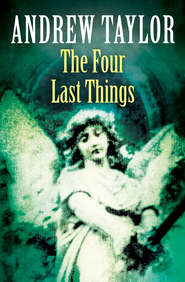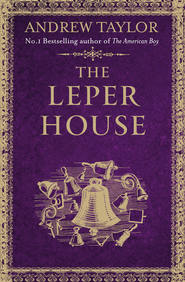По всем вопросам обращайтесь на: info@litportal.ru
(©) 2003-2024.
✖
The Scent of Death
Автор
Год написания книги
2018
Настройки чтения
Размер шрифта
Высота строк
Поля
‘Bella, Bella,’ the Judge said. ‘A man must go where he is ordered. You know that, as a soldier’s wife.’
‘Yes, sir,’ she said. ‘Of course I know it. But a child cannot understand the bitterness of parting in the way a wife can.’
Mr Wintour patted her hand. ‘You are too tender-hearted, my dear.’
‘Five years old is very young.’
‘It cannot be helped,’ I said. ‘Though I wish with all my heart that it could.’
Chapter Sixteen
Mr Townley lived very comfortably with his family in a commodious and most respectable house in Hanover Square, next door to an admiral. Most of the ground floor was given over to business.
I had gradually learned that Townley was a man with his fingers in many pies. As well as superintending the city’s police, he sat on several boards, one to do with the execution of port regulations and another to do with the issuing of licences to the cartmen who transported goods about the city and its environs. He had a warehouse on Long Island and also leased Norman’s Slip, out on the Greenwich Road, which enabled him to trade on his own account.
‘My dear sir,’ he said, when I brought the news that my mission in New York had been extended, ‘how very agreeable – for us, at least. And for you too, I hope. Now pray sit down. Another five or six months, eh? Nothing could be better.’
We were in his private room, a back parlour. There was an autumnal chill in the air, and a fire burned brightly in the grate.
‘Will you look for an establishment of your own now?’ Townley asked, leaning forward in his chair. ‘You would be so much more comfortable. I believe I could find you most respectable lodgings in Queen Street if you liked: three chambers, a spacious parlour, a kitchen and wine cellar there. With use of the hall, of course, and the coachhouse and the stables. The widow who owns the house – a most delightful lady – is a friend of my wife’s. I’m sure I could obtain a six-month lease for – let me see – forty-five guineas.’ He raised a long, languid hand as if I had objected. ‘The American Department has a position in the world, after all. Mr Rampton would wish you to live in a style that befits it.’
‘I shall remain at Judge Wintour’s, sir, for the time being at any rate. It is very convenient in all respects.’
‘Ah.’ He looked up. ‘Well, no doubt Mrs Arabella is an excellent housekeeper. It is in fact her house, you know – it was her father’s residence in the city – though she has lent it to her parents-in-law for the duration of the war. But in any case, I am sure the family is happy to have you there.’
Neither of us mentioned money, but I knew my two guineas a week must be a welcome addition to the Wintours’ income. The Judge needed ready money. Everywhere in the house were signs of past affluence and present shortages, from Josiah’s livery with its frayed cuffs and stained armpits, to the carefully rationed tea leaves which were re-used at least once above stairs and probably two or three times more in the kitchen and the slave quarters.
‘Still,’ Townley continued, after a pause, ‘I wonder how you will find Warren Street when Captain Wintour returns.’
‘Equally convenient, I hope.’
‘That remains to be seen. Captain Wintour is not the easiest of men. Of course he has reason enough for that.’
‘Because of Saratoga?’
‘Yes, indeed.’ Townley glanced at me, his face bland but oddly attentive. ‘But there are other reasons, too. He had great expectations from his father-in-law, Mr Froude, but this war has put paid to those, at least until we have peace again.’ He paused. ‘When does he come home?’
‘In a few weeks. He is well enough to travel now, I apprehend, and is in Quebec. His father has sent money for his passage home.’
There was a tap on the door, and Mr Noak brought in a letter for Townley to sign.
‘Ah – the incomparable Noak,’ Townley said with a smile. ‘I cannot imagine how I managed without you.’
Mr Noak bowed but did not return the smile. He was now permanently employed by Mr Townley, who entrusted him with the management of more and more business. His unobtrusive efficiency was matched by his kindness of heart, as I had learned from his care of me at sea. So I was not altogether surprised when, one Sunday afternoon in September, I had found him in the drawing room at Warren Street reading the Bible to old Mrs Wintour, whose eyes were failing. These Sunday visits had settled into what was almost a routine; Mrs Wintour became quite agitated if Mr Noak happened not to be at leisure.
‘There was one other matter, sir,’ Noak said as he took back the letter from Townley. He hesitated, waving the letter to and fro to dry the ink.
‘You may speak, man – we need have no secrets from Mr Savill.’
‘Yes, sir. It is only the docket for Major Marryot.’
‘What of it?’
‘The list includes the boy found drowned by the Paulus Hook ferry. I believe he may be the Government informer who goes by the name of Benjamin Taggart.’
Townley straightened his long spine. ‘Oh yes – well, was he murdered?’
‘I cannot say for certain, sir, either way – he drowned, that is all; I saw no sign of violence on his body. They are keeping it at King’s Wharf for the time being. But what shall I say your recommendation is?’
‘To let sleeping dogs die. Or, rather, drowned dogs in this case.’ He chuckled in appreciation of his own wit. ‘Unless there are reasons why Major Marryot should enquire further into it?’
‘Not that I am aware of, sir. And, even if there were, the boy’s body can tell him nothing more than it already has.’
‘Well, then. I think we need waste no further time on a slave’s by-blow, do you? And I’m sure Major Marryot will agree.’
Noak bowed.
‘Mind you,’ Townley said, ‘Taggart did us one good service, did he not?’ He turned to me. ‘It was he who tipped us the wink about poor Pickett’s murderer. You remember? The runaway, Virgil. We’d not have been able to hang the rogue without Taggart.’
Chapter Seventeen
There could be no harm in it, surely?
On the other hand, a prudent man knew when to leave well alone. Especially a man with his way to make in the world.
As the day went on, I found myself thinking more and more about the Pickett affair. I could not avoid the fact that I felt not only curious about his murder but also in some strange way responsible for the runaway slave they had hanged for it.
It was as if I had failed him.
But was not the man a convicted murderer? Who was I to set my judgement against that of the officers who had made up the court martial? They were vastly experienced; they had been cognizant of all the facts – whereas I was but newly arrived in this city and a positive babe in arms in such matters. Most important of all, my duty was merely to observe the administration of justice: apart from that, I had no legal standing in the affair; nor was I under any moral obligation to go beyond the terms of my commission.
And yet – these were a civil servant’s arguments, perfectly adequate for a departmental inquiry or Mr Rampton or even a court of law. But they did not quite convince me as a man. Now Taggart, the informer, was dead too.
The decision hung in the balance for the rest of the morning, and later at the coffee house where I dined alone and frugally on an elderly mutton chop and a pint of sherry. At the end of the meal, I decided to let chance take a hand in the matter. I felt in my waistcoat pocket for the ivory die I had found under Pickett’s body. I pushed aside the plate and brushed the crumbs away with the napkin.
If it came up with an odd number, I should go back to the office and forget all about the drowned informer, the hanged slave and Pickett’s murder. If the number were even, I should refresh myself with a stroll to the river in the mild afternoon sunshine.
I rolled the die. It danced across the stained linen cloth, ricocheted off the base of the wine glass and came to rest beside the fork. It was a four.
There could be no harm in it, I repeated to myself again and again like a Papist with his rosary, as if repetition could somehow make it true. There could be no harm in it, none in the world.
The Paulus Hook ferry was at the north-west end of Cortland Street, by King’s Wharf. My choice of route proved to be a mistake, for Cortland Street took me through the desolate heart of Canvas Town, not far from the cellar where they had found the body of Roger Pickett.
The roadway itself was an illicit market place. As I passed along it, three whores solicited me, a negro offered me a Pembroke table with three legs and two unmatched chairs, a one-armed soldier tried to sell me a pair of boots, a variety of entertainers sought to distract me, and beggars haunted my every step. A woman showed me the baby at her breast. ‘For the love of God,’ she said, ‘for the love of God.’
This was the other New York, the shadow town, the dark simulacrum of the prosperous shops and stalls that lined Broadway.
At the end of the street, a breeze was coming off the water. Near the shore the river was dense with small craft bobbing on the swell. Further out lay a scattering of merchant ships with a line of men-of-war beyond them. The sea shifted and glittered in the sunshine. A mile or so away was the Jersey coast.











